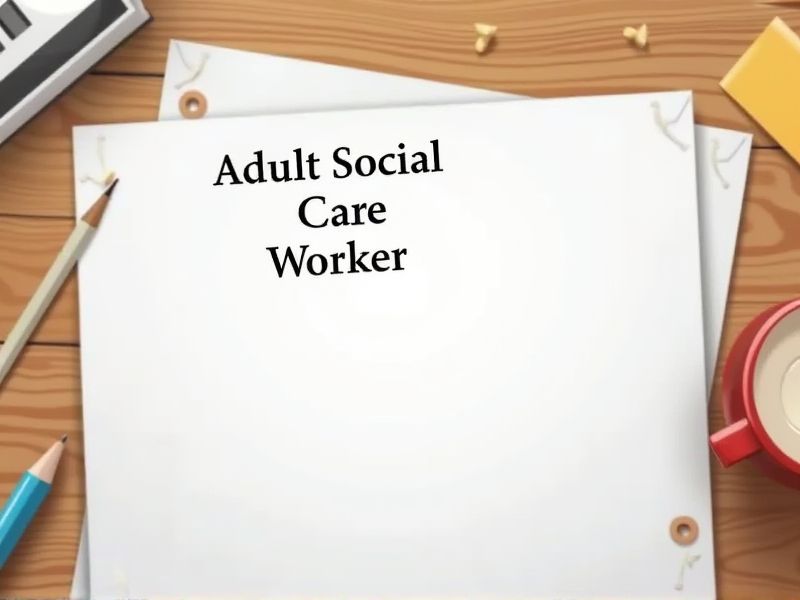
Adult Social Care Workers need specific certifications to ensure they provide safe and effective service to the individuals they support. National and local regulations often require certain qualifications to maintain high standards in care. These certifications validate a worker's knowledge of essential skills, such as health and safety protocols, first aid, and safeguarding vulnerable adults. Below are crucial certifications necessary for a career in Adult Social Care.
NVQ Level 3 in Health and Social Care Certification
The NVQ Level 3 in Health and Social Care Certification ensures adult social care workers possess essential knowledge and skills necessary for effective care delivery. It provides a standardized measure of competency that enhances the quality of service for individuals receiving care. This certification equips workers with advanced problem-solving abilities and confidence in handling complex care situations. Regulatory bodies and employers often require this qualification to ensure adherence to health and safety standards within the care sector.
Care Certificate
The Care Certificate sets a standardized approach to training, ensuring that adult social care workers possess fundamental skills and knowledge. This requirement leads to improved quality of care, as workers are better prepared to address the diverse needs of adults in care settings. Employers often see reduced incident rates and higher satisfaction levels among care recipients when their staff are Care Certificate-trained. Compliance with this standard enhances the professional credibility and employability of care workers within the industry.
Safeguarding Adults Certification
Safeguarding Adults Certification equips social care workers with the knowledge to identify and respond to signs of abuse or neglect, reinforcing their role in protecting vulnerable individuals. The training ensures adherence to legal frameworks and organizational policies, mitigating the risk of liability for both the worker and the institution. By promoting a culture of vigilance and accountability, the certification enhances trust and credibility in care services among clients and their families. Consistent training updates keep workers informed about the latest best practices, fostering continuous improvement in care quality.
Manual Handling Certification
Manual Handling Certification equips adult social care workers with the necessary skills to prevent injuries while lifting or moving patients, which reduces workplace accidents. Trained workers ensure compliance with health and safety regulations, minimizing legal risks for both the employee and the organization. Proper manual handling techniques enhance the quality of care provided to service users, promoting a safer and more supportive environment. Certification programs foster a culture of continuous learning, which can improve job satisfaction and employee retention rates.
First Aid Certification
First aid certification equips adult social care workers with essential skills to manage emergencies effectively, ensuring improved outcomes for individuals in their care. Knowledge of first aid minimizes risk, potentially reducing the severity of injuries and preventing complications. Certified workers contribute to a safer environment, instilling confidence in clients and colleagues. Regulations and legal responsibilities often require such certifications to maintain compliance and uphold safety standards within care settings.
Infection Prevention and Control Certification
Infection Prevention and Control Certification equips adult social care workers with critical skills to reduce the spread of infections among vulnerable populations. The certification provides evidence-based protocols that enhance worker and patient safety in caregiving environments. Regulatory bodies often require such certifications to ensure compliance with health standards and protocols. Certified workers can improve health outcomes, which contributes to overall public health and reduces healthcare-associated costs.
Medication Administration Certification
A Medication Administration Certification ensures that adult social care workers possess the necessary skills and knowledge to safely handle and distribute medications. This certification reduces the risk of errors in medication management, which can lead to adverse health outcomes for individuals in care. Regulatory bodies often mandate this certification to comply with healthcare standards and ensure the safety and well-being of clients. Obtaining such certification also empowers workers with greater confidence in their roles, contributing to improved job performance and client trust.
Equality and Diversity Training Certification
Equality and Diversity Training Certification is crucial for adult social care workers because it equips them with skills to understand and respect the varied backgrounds of individuals they support, leading to more personalized care. By promoting inclusivity, workers can reduce instances of discrimination and communicate effectively, fostering a safer environment for both staff and clients. Such training supports compliance with legal frameworks like the Equality Act 2010, which mandates non-discriminatory practices in care settings. Gaining this certification can also enhance a worker's professional development, increasing employability and career advancement opportunities in the sector.
Fire Safety and Evacuation Certification
Fire Safety and Evacuation Certification ensures adult social care workers have the skills to protect vulnerable individuals in emergencies, directly impacting the safety and well-being of those in their care. Proper training reduces the risk of injury or fatality during a fire, as workers can make informed decisions under pressure. Compliance with legal and regulatory requirements is essential for maintaining operational accreditation and avoiding potential legal consequences. Knowledge in fire safety fosters a culture of preparedness and responsibility among staff, enhancing the overall safety environment within care facilities.
Data Protection and Confidentiality Certification
Data protection and confidentiality certification ensures adult social care workers understand legal requirements related to privacy and compliance. It minimizes the risk of data breaches, protecting both the individuals in care and the reputation of the care provider. Training in these areas reinforces professional standards, fostering trust between care workers and clients. Fulfillment of such certification demonstrates commitment to ethical practices, essential for the sensitive nature of adult social care.
Summary
When you obtain certifications as an Adult Social Care Worker, your professional credibility and expertise level rise significantly. This certification often results in access to better job opportunities and potential for higher salaries. Employers generally view certified professionals as more competent, leading to increased trust and responsibility. Moreover, certification may provide you with specialized skills, enhancing the quality of care you deliver.
